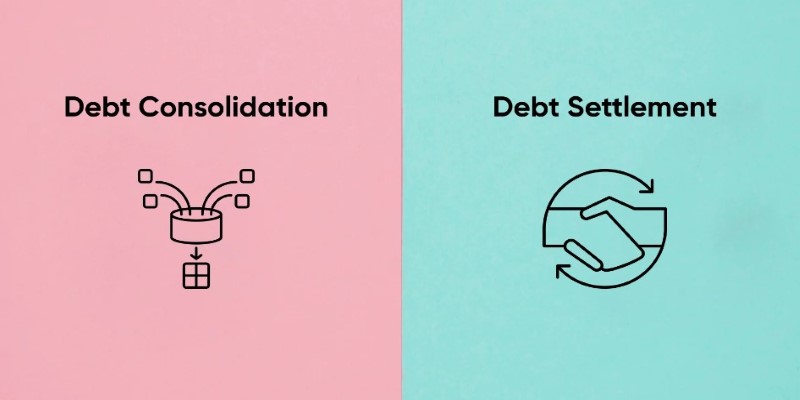Managing debt can be stressful and overwhelming. When debt starts piling up, many individuals look for solutions to take control of their finances and regain peace of mind. Two popular options are debt settlement and debt consolidation, but how do you know which path to choose?

Each strategy has its advantages and potential downsides, so understanding both options can help you make the right choice for your financial needs. In this article, well dive into what debt settlement and debt consolidation are, explore their pros and cons, and help you identify key differences to make an informed decision.
What is Debt Settlement?
Debt settlement is a financial strategy where a debtor negotiates with creditors to reduce the total amount owed. Instead of paying back the full balance, the individual works towards a settlement that is less than the original debt, essentially paying a lump sum as a one-time payment or structured installments. This approach is typically undertaken with the help of a debt settlement company, although some people choose to handle negotiations on their own.
Debt settlement is usually seen as a last resort for those who cannot keep up with their debt payments and are considering bankruptcy as an alternative. The aim is to settle the debt for a lower amount than owed, relieving the burden while allowing creditors to receive at least some payment.
Pros of Debt Settlement
One of the main advantages of debt settlement is the potential to pay off debt for a significantly lower amount than originally owed. This can be particularly helpful if your debt has grown beyond a manageable level, and you find yourself unable to keep up with regular payments. Reducing your debt can ease the burden and make it easier to become debt-free more quickly than if you had to pay the entire balance.

Additionally, debt settlement may help you avoid bankruptcy, which can have long-term negative effects on your credit score and financial future. While debt settlement does impact credit, it can be a preferable option compared to the more severe consequences of bankruptcy.
Cons of Debt Settlement
Despite the appeal of reducing debt, there are significant downsides to debt settlement. One major drawback is the potential damage to your credit score. Since most debt settlement programs require you to stop making payments while negotiations are underway, your credit score can drop significantly due to missed payments. This could have long-lasting effects on your ability to secure loans, credit cards, or even rental agreements.
Debt settlement also involves feesoften charged as a percentage of the total debt settled. While you save money by reducing the debt owed, the fees can add up, potentially limiting the overall savings.
What is Debt Consolidation?
Debt consolidation is a financial strategy that combines multiple debts into a single, manageable payment, often with a lower interest rate. Unlike debt settlement, debt consolidation does not reduce the overall amount owed; it merely restructures your debt to make payments more affordable and manageable.
This is often achieved through a consolidation loan, a balance transfer credit card, or a home equity line of credit (HELOC). By consolidating your debt, you shift from juggling multiple payments with different interest rates and due dates to managing one payment at a typically lower interest rate.
Pros of Debt Consolidation
The primary advantage of debt consolidation is simplicity. By merging multiple debts into a single payment, you make your financial life easier, reducing the chances of missing payments and incurring late fees. This approach allows you to streamline your finances and work towards becoming debt-free at a more predictable pace.
Additionally, debt consolidation often provides a lower interest rate than what youre currently paying on credit cards, personal loans, or other high-interest debt. Over time, this can save you money and allow you to pay off your debt more quickly.
Cons of Debt Consolidation
While debt consolidation simplifies your debt payments, it does not reduce the total debt owed. This means that unlike debt settlement, you will still be responsible for paying the full amount over time. Additionally, depending on your loan terms and how long you take to repay the consolidated debt, you could end up paying more in total interest over timeeven with a lower interest rate.
Another potential pitfall is the risk of accumulating more debt. Once you've consolidated your debts into a single payment, it may feel like you have more financial breathing room. However, without proper discipline, there's a temptation to continue using credit cards and racking up new debt, which can lead to a cycle of borrowing and consolidating without actually eliminating your debt.
Key Differences: Debt Settlement vs. Debt Consolidation
Debt Reduction vs. Restructuring: Debt settlement reduces the overall amount owed, while debt consolidation restructures debt into a more manageable form without reducing the total amount.
Credit Impact: Debt settlement can significantly lower your credit score due to missed payments, while debt consolidation can have a neutral or positive effect if payments are made consistently.

Time to Debt Freedom: Debt settlement often leads to a quicker path to becoming debt-free since youre paying a reduced amount. In contrast, debt consolidation may extend your repayment period, although it simplifies payments.
Fees and Costs: Both strategies come with their own costsdebt settlement often involves fees for the settlement company, while debt consolidation can include loan origination or transfer fees.
Tax Implications: Debt forgiven through settlement may be considered taxable income, whereas debt consolidation does not have this consequence since no debt is forgiven.
Conclusion
Choosing between debt settlement and debt consolidation depends on your financial situation, your goals, and your ability to manage repayment. Debt settlement may be an option for those facing financial hardship who are unable to make regular debt payments and are seeking to reduce the total debt owed. However, it comes with risks, including a potential hit to your credit score and fees involved in the settlement process.







